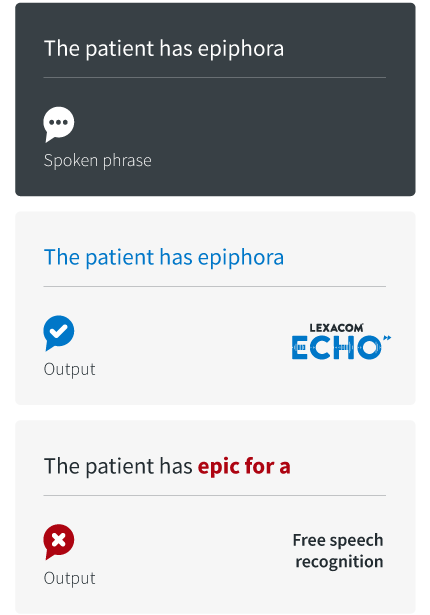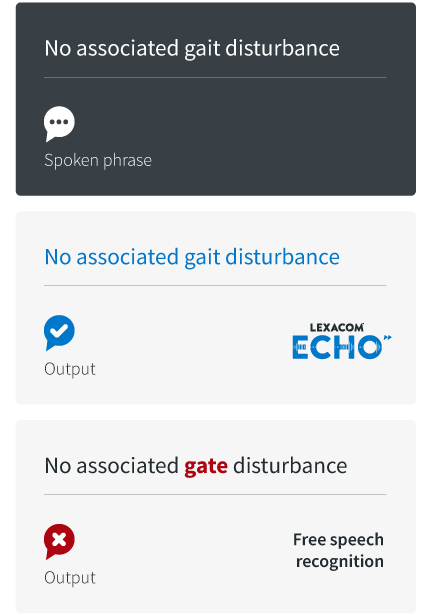Why choose Lexacom Echo over free speech recognition software?
Speech recognition technology is evolving all the time, and on the surface, free software may be a tempting choice over paid options. However, there are many factors to consider, including accuracy, speed, and security.
Here’s what makes Lexacom Echo the superior choice.
- Market-leading accuracy
- Medical specific dictionary
- Contextual understanding
- From one application, into any application
- Data privacy
Market-leading accuracy
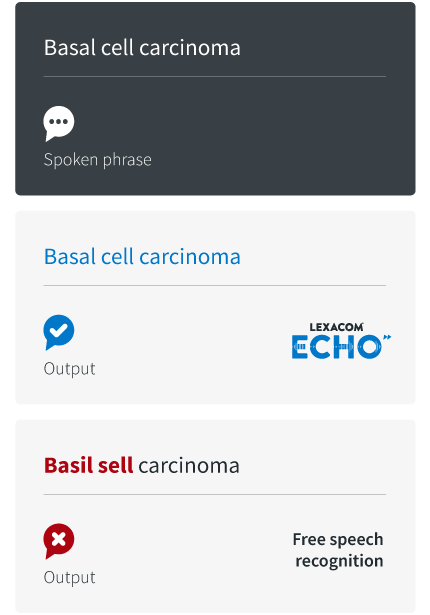 Rather than being one add-on feature within a piece of software, Lexacom Echo is a dedicated speech recognition solution, developed to handle nuances in language, different accents, and a range of vocabularies. Further, Lexacom Echo is continuously being refined to add new and unique features that go beyond what many imagine speech recognition is capable of.
Rather than being one add-on feature within a piece of software, Lexacom Echo is a dedicated speech recognition solution, developed to handle nuances in language, different accents, and a range of vocabularies. Further, Lexacom Echo is continuously being refined to add new and unique features that go beyond what many imagine speech recognition is capable of.
One of the key markets for Lexacom Echo is healthcare, where having correct notes is vital. We are trusted by thousands of clinicians across the UK and across the world, who accurately convert the words they say into text onscreen.
*All examples used are results of tests performed using Lexacom Echo, and two free, widely available and widely used alternatives. Tests performed in July 2024, at the same time, in the same room, on the same computer.
Medical specific dictionary
Free solutions are unfamiliar with medical terms, and often make a best guess of what users say, for example, “tachypnoea” may output “tackip near” onscreen, and “epiphora” could become “epic for a”.
One of the factors that makes Lexacom Echo the most accurate speech-to-text solution is an integrated, NHS specific medical dictionary. Lexacom Echo understands the words clinicians use, and reproduces them precisely. Fewer mistakes means less time correcting mistakes, and so significantly quicker data entry. Patient notes, letters, and reports can all be dictated with confidence.
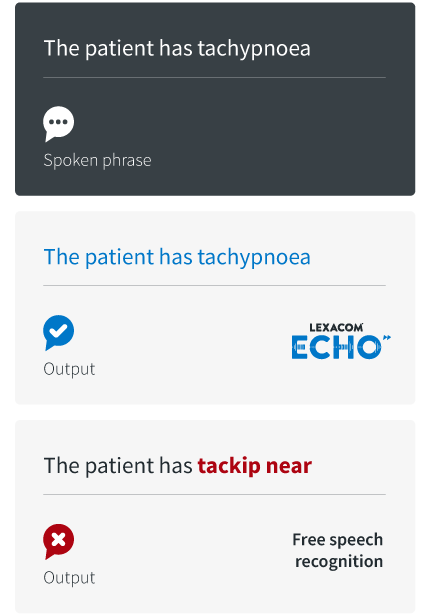
Contextual understanding
Lexacom Echo understands what users say, so where words may sound similar – or the same – the meaning of each sentence is considered as a whole, and the correct words are selected to suit.
Clinicians dictate documents as they naturally would in a conversational style, at their usual pace, and rely on Lexacom Echo to transcribe their words accurately, as they are spoken. There is no voice training needed; the software is ready to use as soon as it is installed.
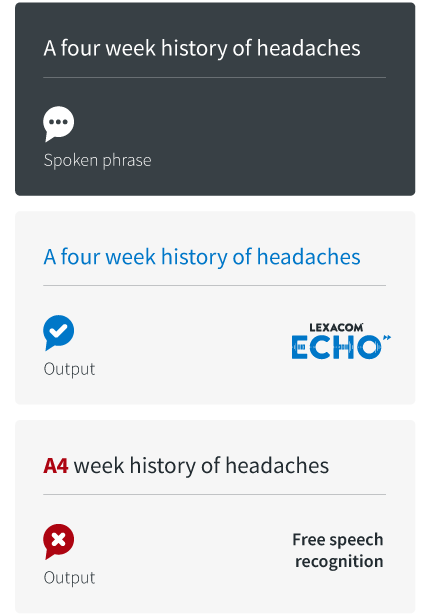
From one application, into any application
Both of the free speech recognition alternatives we tested are just one add-on feature within an application, and are only available within those applications. For a clinician to enter text from free speech recognition options into clinical systems and patient communication platforms, the dictation must first be made in one application, and then copied and pasted to where the user would like.
Breaking the flow of work in this way is a significant limitation of free speech recognition solutions, and can lead to errors being made when pasting text.
Lexacom Echo works independently to other applications. Wherever you can enter text, you can dictate instead, so as well as working across all Microsoft applications, it works in all clinical systems, where notes are directly added to patient records – even tabbing to different fields with your voice. It is discreet in size, and can be left open ready for use whenever needed.
Another intuitive feature lacking in free software is integration with microphones. Lexacom Echo allows you to use buttons on a handheld microphone or headset, so audio input can easily and instantly be toggled on and off.
Data privacy
Perhaps the most important point to consider when choosing speech recognition software within healthcare is where the data is processed; there is no data more sensitive than a patients’ medical records. When using many free solutions, including the two we tested, speech files are sent to data centres in the USA to be processed, before being sent back to users.
In the UK, the security risk this method of data handling presents breaches GDPR regulations.
Lexacom Echo complies with UK GDPR regulations, as all audio data is processed in UK data centres.
On the subject of UK vs USA, when testing the two free speech recognition options – with UK English selected – American spelling variants of medical conditions were given. A minor point perhaps, but not to us!
Summary
This article has covered the differences in accuracy, functionality, and privacy offered by free speech recognition services in comparison to Lexacom Echo medical speech recognition.
What it has not covered is the many other features Lexacom Echo offers, like navigating and controlling applications with voice commands, adding definitions to medical terms to explain them to patients, automatically converting medical terms into shorthand, and even automatically coding clinical information.
If you’d like to find out more, book a demonstration and see what Lexacom Echo can do.
